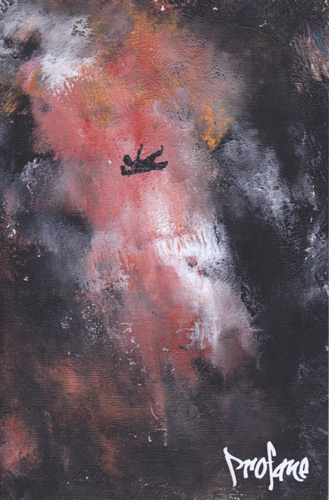Profane – Winter 2014
Weirdness attracts weirdness, unless of course, you are the kind of reader that is repulsed by the idea of dinosaur pornography written by an elementary-aged girl. (More on Benjamin Drevlow’s story later.) I am not that kind of reader, and neither are the editors of Profane. This journal aims to unsettle minds and bring to the page tales that are, “sacred, profound, heartfelt, raw, quirky, and, at times, a little weird.” Aside from its peculiar content, Profane also includes a raw soundtrack of the authors reading their work on its website. Not all writers are professional recording artists which makes listening to the text all that more interesting as the “authors’ very lives have bled into these tracks.” Weirdness attracts weirdness, unless of course, you are the kind of reader that is repulsed by the idea of dinosaur pornography written by an elementary-aged girl. (More on Benjamin Drevlow’s story later.) I am not that kind of reader, and neither are the editors of Profane. This journal aims to unsettle minds and bring to the page tales that are, “sacred, profound, heartfelt, raw, quirky, and, at times, a little weird.” Aside from its peculiar content, Profane also includes a raw soundtrack of the authors reading their work on its website. Not all writers are professional recording artists which makes listening to the text all that more interesting as the “authors’ very lives have bled into these tracks.”
Profane opens its inaugural issue with Amy Woschek Schmidt’s poem “Barricade Against.” It reads like watching an episode of Buried Alive—outsiders and insiders are torn between the logistics of various mental states. Schmidt uncovers the truth of every human; we are afraid of our capacity to keep, or our ability to become, that “compulsive oddity / east of town.”
The structuring of the magazine seamlessly chunks thematic pieces together without indication. There are poems about mental conditions, narratives about bodies, pieces that are influenced by musicians and music, and they all run into one another like estranged family members at a family reunion. Preceding Schmidt is Devin Murphy’s narrative, “Sad For Who I Am,” carrying on the theme of the twisted implications “normal” people make about those who are in less-than-normal situations. The insinuations others create are more bizarre than the truth; a father cannot be a father to his little girl without simultaneously being a child molester. It makes one think: the value in human worth has truly gone down in recent years.
The magazine offers not only fiction and poetry, but creative nonfiction as well. Debora Thompson’s short “Merengue to Namaste” takes the reader through a typical Zumba routine with quirky commentary. I’ve seen these women at the gym and am guilty of silently judging their belief in the dance. Even more-so, I am guilty of laughing at those who, as Thompson describes, “[ . . . ] look like I’m seizing.” Yet, there is nothing funny about being trapped in one’s body when one’s mind is much greater (and younger) than their exterior. However unfortunate it is to be imprisoned in this mindset, Thompson does a good job at centering our thoughts away from a woman’s core and back to how we perceive ourselves.
Set in the heart of Profane—an interview with Maggie Nelson. While I must confess that I did not know of this woman prior to reading, I walked away with a few great tips on writing. The golden line being, “I think people should take from everything and write exactly what they want to write.” I considered the authors surrounding her interview and felt that she perfectly captured what Profane values in its contributors.
Joshua Sanders is this issue’s featured poet with a collection of four poems. Of the four, I found his take on Sleeping Beauty realistically enchanting, albeit nothing magical happens. While the mention of Aurora’s name creates an instant image, her beauty decomposes in “Aurora Touches the Spindle”:
[ . . . ] Picture
the fairy godmothers circling her bed like nurses:
sniffing bedsores, thumbing open the eyes [ . . . ]
Profane encompasses many abnormal stories, but none more so than “Ina-Baby” by Benjamin Drevlow—an 18-page narrative, the longest in the magazine. Drevlow comically exposes us to the despondent life of a little girl raised by a literary professor and mechanical engineer. She tries to make sense of both her parents’ worlds by combining her love of dinosaurs with her gift of writing: “[ . . . ] Ina told the entire classroom of people, Because this one is for my parents and I love them and they love me and we are a love triangle not to be broken.” However, despite her efforts to bring art and science together, she meets a tragic end in her early adulthood.
There should be no expectations when flipping through the pages of Profane, except to be delighted by the strangeness of life and all those who choose to write about it.
[www.profanejournal.com]





